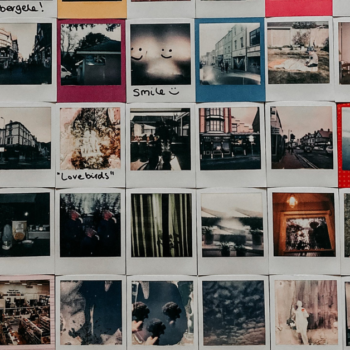Retail Therapy While Grieving: Coping with Grief and Comfort Shopping
/ Coping with Grief : Litsa
Call it overspending, emotional spending, retail therapy, or comfort shopping. No matter the name, spending money in an effort to feel better during tough times is nothing new. And, despite the bad rap it gets, it isn't all bad. Or it isn't always bad. Plenty of grieving people buy things in an effort to cheer themselves up. It's okay to spend money to make life after loss feel a little more tolerable. These grief splurges can actually be helpful, in moderation. I just want to start with that disclaimer before we dig into the complications.
The problem arises when those occasional grief splurges become chronic grief overspending. If your credit card bill (repeatedly) comes in and that comfort shopping spree last weekend now feels anything but comforting, it could be a reason to pause. Or if you keep splurging on things like new wellness products, new hobbies, new wardrobes, new memorial objects, or new life coaches, but you end up feeling as empty as ever, it can be time to take stock of those spending decisions.
This is actually the second article in a series on grief and finances. In our first article, we talked about how to understand your relationship with money and how that impacts what you do (and don't) spend money on while grieving. If you missed that article, please check it out first. It covers some concepts about money beliefs that are important to understand before we get into grief and comfort shopping.
Why Do We Buy Stuff?
Now, this might seem obvious. We buy stuff because we want stuff. Be that shoes or cars, takeaway coffee or an iPad, it doesn't seem complicated. But why do we want stuff? If I have plenty of shoes to get me through the week, why would I want more shoes? If I already have an iphone and a laptop, why would an iPad catch my eye at the store?
It turns out wanting stuff is slightly more complicated than simple wanting. A quick reminder about how the brain works: in a deeply physical and biological way, our brains reward us when we do things that are good for our survival. When we eat high-calorie foods or have sex, our brains release all sorts of feel-good neurotransmitters. These chemicals give us an intensely pleasurable feeling. When somethings feels good, we remember to do that thing again and again and again. And it turns out that accumulating stuff works the same way the same way as food and sex.
But why?
Thousands of years ago, long before Instacart and TikTok, our survival depended on things like clothing and weapons and shelter. Lucky for us, our brains rewarded us with a little hit of dopamine (a feel-good neurotransmitter - one of the same ones released when we do drugs) every time we got a new item. This motivated us to get and keep more and more stuff, which was pretty darn helpful for our survival individually and as a species.
That's the good news. The bad news is that this pleasure center doesn't really have an off-switch. We now live in a post-industrial revolution, capitalist world where stuff is in abundance. There are sugary and fattening foods in every corner store. We can buy clothing with a tap of a finger and have it magically show up on our doorstep the next day. All this and most of us no longer have to use our energy to flee from predators, hunt our food, or build our own shelter. Though many people still struggle with basic needs, many have more than they need to survive. But our brains weren't designed to stop rewarding us just because we have plenty of stuff to survive. So no matter how much stuff we have, our brain still rewards us when we accumulate more. It's an adaptive leftover that isn't always so adaptive these days - especially when it comes to grief and comfort shopping.
But What Does Spending Have to do with Grief?
If you've read our articles on alcohol use and grief or comfort eating in grief, this all might sound familiar. The principle is similar for grief and emotional spending. When we feel low, our brains crave even a small bump of pleasure. Grieving can make it hard to find pleasure in even the things that brought us deep joy before the loss. So when we get even a short, temporary neurochemical bump of those feel-good neurochemicals, from something like a glass of wine or eating calorie-heavy foods or buying something new, it can feel especially good.
You might not have to imagine too hard what it feels like when day in, day out you're deeply missing your loved one, struggling to connect with friends, feeling unmotivated to rejoin your choir or gym or book club, and feeling disengaged at work. It's no surprise when you've been feeling down all week, that when Friday rolls around, a trip to the bookshop for three new books that you may or may not read, a skirt you happened to see in a shop window, and a takeaway meal feels like a real boost. That dopamine and serotonin kick on in your brain and, at least for a little while, you feel something other than the malaise you've felt all week.
Sadness Also Makes Us More Impatient and Willing to Spend More
(aka the Misery-is-not-Miserly Effect - yes that's the actual name)
Research has consistently found that sadness makes us a bit self-focused and myopic. But it turns out that sadness and self-focus also mean we're likely to spend significantly more money on things than when we're not sad. Several studies found that sad people were willing to spend up to four times more on small household and office items, like water bottles and highlighters, than those who were not sad. Weird, I know.
On the flip side, they were also willing to sell off items for a lower value than those who weren't sad. So, even if you don't relate to spending sprees on gaming systems or new shoes, this study shows that you might relate to just spending more on what you need, rather than hunt for a deal. And you may be willing to sell your old car for a song, rather than negotiate a better sale price. The research can't say for certain why this is. But the authors believe this is because when we're sad, we want to change our situation and we're impatient about it - we just want the new object (or the money from the sale of the old object) as soon as possible. The authors explain that "sadness triggers the goal of changing one’s circumstances, increasing buying prices but reducing selling prices" (Lerner, et al 2012)
Sadness Also Means We Have a Harder Time Appreciating Delayed Value
Another study found that are more impatient when we are sad, so we're willing to actually forfeit money in favor of immediate gratification. One study from Harvard and Columbia looked at the impact of sadness on delaying gratification and found :
Using data collected at the Harvard Decision Science Laboratory and the Center for Decision Sciences at Columbia, the authors found that subjects randomly assigned to view a video that induced sadness exhibited impatience and myopia, which were manifested in financial decisions that elicited higher gains in the short term, but lesser gains over the longer term. Thus, subjects in the sadness condition earned significantly less money than subjects in the neutral condition. They showed what is known as “present bias,” wherein decision makers want immediate gratification and so they ignore greater gains associated with waiting. “Across three experiments, the median sad participant valued future rewards (i.e., those delayed by 3 months) 13% to 34% less than did the median neutral-state participant. These differences emerged even though real money was at stake and even though discount rates in the neutral condition were already high,” the authors reported.
https://www.psychologicalscience.org/news/releases/new-study-examines-the-financial-costs-of-sadness.html
What's Wrong with a Little Emotional Shopping Sometimes??
Like we said at the start - nothing at all, assuming a few things are true:
- You spend mindfully.
- It isn't negatively impacting your finances.
- You aren't feeling guilt or regret about the spending afterward.
- It isn't getting in the way of doing things that are more aligned with my values. (so I'm spending all my extra money on shoes and then disappointed that I can't afford a plane ticket to go and visit my best friend).
- Overall, you feel the things you spent money on were worth what you spent
The problem comes up when any of the things above aren't true. This doesn't have to do with your total budget - whether you have tons of money or are barely scraping by, emotional spending can be risky no matter what. It has more to do with how you spend in proportion to, how often you impulse spend, whether you're in control of your spending, if you're spending to avoid emotions or fill a void, and how often you look back on your spending with regret.
Reflecting Back on your Comfort Shopping
Sometimes we find ourselves comfort shopping in grief, just to get that quick, short-term dopamine bump. But it is important that we look at how those purchase later. Buying a stereo on sale at Best Buy probably gave you that quick neurochemical boost that our brains love. Looking back on the purchase after a few weeks, you might think that it was well worth it. You've been using it daily, music boosts your mood and the great sound quality makes a difference, etc.
Or you might realize you still spent more than you wanted to, just because it was on such a good sale. You're not using it that much, you're actually not an audiophile so the difference in quality isn't appreciable. You might also realize that spending the money on that purchase meant you didn't have the money to take on a class that you'd very much been hoping to take. Regardless, the important thing when you're worried that grief has you comfort shopping too much is to reflect back on those purchases to assess the impact beyond that initial dopamine hit.
Yikes, this is me . . . what do I do?!
Don't worry, you're not alone and getting emotional spending in grief under control is a manageable project. The first step is recognizing some of the things we've just discussed in yourself. Ask yourself the questions to increase your awareness of your comfort spending:
- I tend to emotionally spend when I am . . . (lonely, bored, sad, scared/anxious, tired, happy)
- What do I tend to overspend on that I don't value later, regret later, etc?
- Where do I tend to overspend? (at stores, online, at restaurants, etc)
- When do I overspend? (on my lunchbreak, late at night, on the weekends, when I'm drinking, when I'm alone, when I'm with friends, etc).
Listen for Your Rationalizations
As human beings, we are great at giving ourselves permissions for our behaviors when we want to. Grief makes it pretty easy to give ourselves permission to . . . do just about anything we want! Life has been brutal and overwhelming. We've been devastated by loss. It's easy to say things to ourselves like:
- I deserve this.
- Money doesn't matter anyway, so why not?
- This will make me feel better.
- There's no way I could feel any worse, so I might as well.
- It's not that expensive anyway.
- This is finally a good, special occasion when everything has been awful.
- All my goals and dreams are gone anyway, so I have nothing to save for anyway.
These are just a few examples. Getting to know your own rationalizations will help you more quickly hear them and catch yourself when they come up.
Respond to Your Rationalizations
In the moment that you're about to spend, your brain will unquestionably struggle to respond to your own rationalization. So after you've made your common rationalization list up above, take a moment to write out responses to those rationalizations. Keep them saved on your phone, tacked up on your computer, wrapped around your credit card, or wherever else you're most likely to be able to access them when you need them.
Create a Time Buffer and Practice Discomfort
One of the reasons we spend in grief is to avoid painful emotions by filling the space with shopping. One strategy for working on your comfort spending is to delay purchase. If you have the impulse to purchase something, give yourself a timeframe. Tell yourself that you at least need to sleep on it and, better yet, give it a full 48 hours. That delay can be enough to give your brain enough time to assess the decision more fully. You can also practice tolerating the discomfort of not instantly making purchase and sometimes sitting with the pain of grief.
Put Some Space Between You and Spending
Once you've made that list of why, when, and where you spend, think about what buffers you can create. These may include:
- Delete shopping apps from your phone
- Unsubscribe from marketing emails from stores where you over spend
- Stop internet/social media browsing at your high-trigger times
- Avoid shops where you know you have a tendency to overspend
- Put your credit cards away, so they are not easily accessible for use
- Do not store your credit card in any of your online accounts or password manager
Make A List of Alternative Coping
If you know that you spend when you're feeling down, list of other things to do in those emotional moments. This can be anything that is a buffer or boosts your mood in other ways. It might include things like:
- Call a friend or family member (name exactly who those people are!)
- Take a bath/shower
- Listen to a playlist you love
- Take a walk
- Do a hobby you like - video games, draw, play music, pay a sport, garden, cook, whatever
- Lean into your feelings - talk about them, journal, or otherwise sit with the hard feelings you're trying to avoid
- Watch a good movie or show
- Read a book
- Do yoga
- Play with your pet
- Do a puzzle or play other games
- Check out some of the free online grief support courses WYG offers
Congratulate Yourself
Shopping might release dopamine, but so does accomplishing tasks. That means giving yourself a pat on the back every time you resist a spend can help your brain want to continue this pattern of not overspending. You might even want to track each time you resisted a spend and how much it would have been, so at the end of the week or month, you can see just how much you've saved.
Get Help if You Need It
We'd be remiss if we didn't remind you that shopping and spending can become a serious problem. There are many peer and professional resources available for help if you think you have a compulsive shopping problem (a shopping addiction). Find more information here.
What's your experience of retail therapy been while grieving?

We invite you to share your experiences, questions, and resource suggestions with the WYG community in the discussion section below.
We wrote a book!
After writing online articles for What’s Your Grief
for over a decade, we finally wrote a tangible,
real-life book!
What’s Your Grief? Lists to Help you Through Any Loss is for people experiencing any type of loss. This book discusses some of the most common grief experiences and breaks down psychological concepts to help you understand your thoughts and emotions. It also shares useful coping tools, and helps the reader reflect on their unique relationship with grief and loss.
You can find What’s Your Grief? Lists to Help you Through Any Loss wherever you buy books:





Roxanne March 13, 2024 at 3:27 am
Hello, I’m a griever. My first loss was my dad in 1986, then my in-laws then in 2011 my husband was diagnosed with stage 4 colon cancer. That was on March then in December 2011 my mother died suddenly from a dissecting aorta. My husband passed in 2015 then I 2017 my friend and love died from bladder cancer. But the most tragic losses were in 2019 and 2020. First in 2019 my middle son passed from cirrhosis of the liver at the age of 37 then 12 months later in 2020 my oldest son was hit with a car on his motorcycle. He was in a persistent vegetative state for 6 months then his wife decided to take him off the vent. So to say my grief/emotional spending has gotten out of hand is an understatement.
The Most Beneficial Declutter of All - Green Clover Minimalism February 24, 2023 at 8:17 am
[…] Since losing my dad, I’d been struggling with sleep and nightmares, but instead of relaxing and calming my brain, I’d reach straight for my phone and read articles on whatever random and bizarre question was on my mind at the time, sneak a look at distressing news headlines, and scroll through Youtube. Sometimes, I’d even cruise Amazon or the Pokemon Centre (never a good idea to make purchase decisions when tired and grieving!). […]